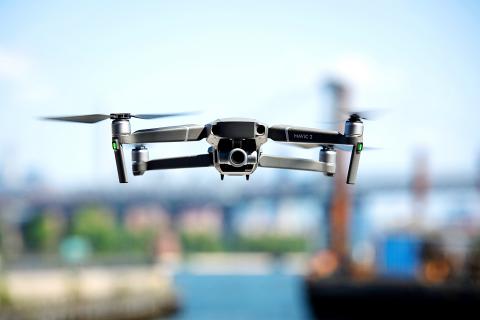The world’s biggest maker of civilian drones could see its products shut out of the US market after a patent infringement complaint was filed by smaller rival.
SZ DJI Technology Co (大疆創新), a Chinese manufacturer of popular hobbyist and commercial drones, including the Phantom and Mavic series, is being challenged by Autel Robotics Co.
The dispute is over unmanned vehicles used for aerial photography and videotaping, as well as for agricultural purposes.

Photo: Bloomberg
The world’s best-selling drone is the family known as the DJI Phantom, which has a distinctive white plastic exterior and a mount for a camera on its belly.
The US Federal Aviation Administration predicted that 1.6 million civilian drones would be sold in the US this year.
The Teal Group from Fairfax, Virginia, estimated the worldwide civilian unmanned aircraft market would reach US$4.4 billion this year.
DJI is accused of using Autel’s patented features for following a flight path while avoiding obstacles, rotor assembly and a way to switch out battery packs to minimize lag time between flights.
Autel wants the US International Trade Commission to ban imports of models of DJI’s Phantom, Mavic, Spark and Inspire drones made in China by DJI, a complaint filed in Washington on Thursday last week showed.
“If DJI’s big market is the US, then this is a big deal for them,” said Paul Brinkman of Kirkland & Ellis in Washington, who specializes in ITC cases, but is not involved in this one.
Autel, which says it designs and makes its drones in the US, contends in the complaint that excluding DJI drones from the US “is likely to improve competitive conditions” in the market by providing opportunities for others, including Autel, Yuneec International Co and Parrot SA.
Even if DJI’s products are excluded, “consumers would still have a variety of products from which to choose that would be manufactured by Autel and other companies,” Autel said in the complaint.
DJI spokesman Adam Lisberg said the company had no comment on the complaint.
The trade complaint escalates a legal battle that has been simmering between the companies for the past two years, after Autel began selling its X-Star quadcopter in the US and later its EVO models. Each has accused the other of incorporating their respective technology without paying for it.
“It’s definitely ramped up the case,” Brinkman said. “Anything on a slow track at district court isn’t going to matter so much.”
By filing a complaint with the US trade agency, Autel has raised the stakes. It is rare for a federal court to block sales, even when it involves competing products. The trade commission, by contrast, often issues import bans if it finds products infringe US patents.
The patents in this case all expire after 2030.

CHIP RACE: Three years of overbroad export controls drove foreign competitors to pursue their own AI chips, and ‘cost US taxpayers billions of dollars,’ Nvidia said China has figured out the US strategy for allowing it to buy Nvidia Corp’s H200s and is rejecting the artificial intelligence (AI) chip in favor of domestically developed semiconductors, White House AI adviser David Sacks said, citing news reports. US President Donald Trump on Monday said that he would allow shipments of Nvidia’s H200 chips to China, part of an administration effort backed by Sacks to challenge Chinese tech champions such as Huawei Technologies Co (華為) by bringing US competition to their home market. On Friday, Sacks signaled that he was uncertain about whether that approach would work. “They’re rejecting our chips,” Sacks

NATIONAL SECURITY: Intel’s testing of ACM tools despite US government control ‘highlights egregious gaps in US technology protection policies,’ a former official said Chipmaker Intel Corp has tested chipmaking tools this year from a toolmaker with deep roots in China and two overseas units that were targeted by US sanctions, according to two sources with direct knowledge of the matter. Intel, which fended off calls for its CEO’s resignation from US President Donald Trump in August over his alleged ties to China, got the tools from ACM Research Inc, a Fremont, California-based producer of chipmaking equipment. Two of ACM’s units, based in Shanghai and South Korea, were among a number of firms barred last year from receiving US technology over claims they have

BARRIERS: Gudeng’s chairman said it was unlikely that the US could replicate Taiwan’s science parks in Arizona, given its strict immigration policies and cultural differences Gudeng Precision Industrial Co (家登), which supplies wafer pods to the world’s major semiconductor firms, yesterday said it is in no rush to set up production in the US due to high costs. The company supplies its customers through a warehouse in Arizona jointly operated by TSS Holdings Ltd (德鑫控股), a joint holding of Gudeng and 17 Taiwanese firms in the semiconductor supply chain, including specialty plastic compounds producer Nytex Composites Co (耐特) and automated material handling system supplier Symtek Automation Asia Co (迅得). While the company has long been exploring the feasibility of setting up production in the US to address

OPTION: Uber said it could provide higher pay for batch trips, if incentives for batching is not removed entirely, as the latter would force it to pass on the costs to consumers Uber Technologies Inc yesterday warned that proposed restrictions on batching orders and minimum wages could prompt a NT$20 delivery fee increase in Taiwan, as lower efficiency would drive up costs. Uber CEO Dara Khosrowshahi made the remarks yesterday during his visit to Taiwan. He is on a multileg trip to the region, which includes stops in South Korea and Japan. His visit coincided the release last month of the Ministry of Labor’s draft bill on the delivery sector, which aims to safeguard delivery workers’ rights and improve their welfare. The ministry set the minimum pay for local food delivery drivers at